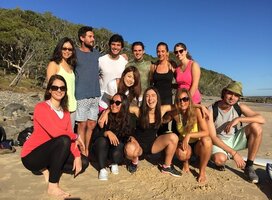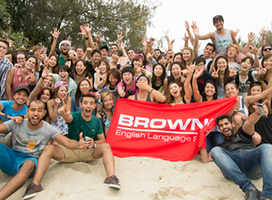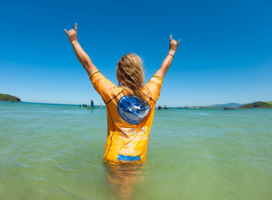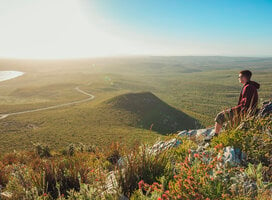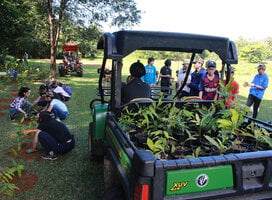English Language Schools in Brisbane, Australia
"I'm chucking a sickie today, want to come over for a middy in the arvo?"
Wondering what that crazy sentence means? Time to come learn English (and some Aussie slang) in sunny, friendly Brisbane!
Australia has always been a top destination for international students, and it's a great place to improve your English skills. The continent is an especially good option for students from Asian countries, since it's closer to home and has slightly less complicated visa processes than countries like the U.S. or U.K..
Australia's third-largest city, Brisbane has all the culture, activities and educational opportunities of bigger cities like Sydney, with a bit more of a laid-back attitude. This riverside city, in the heart of Australia's "Sunshine State," is the ideal place to improve your English skills while making friends among Brisbane's multicultural student population.
Since it's such a popular destination for international students from all across the globe, Brisbane has a wide range of options for improving your English skills, from universities to intensive language institutes.
Universities
University instruction in Brisbane takes place primarily in English, so any university courses will be in English, unless otherwise specified. Most universities also offer English classes for international students who want to improve their language skills. These classes are aimed mostly at students who already have at least an intermediate level of English and need to work on specific skills like academic or professional writing. Universities may provide additional language tutoring through libraries, continuing education courses, or other affiliated institutions.
Language Schools
Language schools and institutes are probably a better option for students with a beginning-to-intermediate level of English, since they usually have a wider range of course offerings, and there are just more of them. Australia's large numbers of foreign travelers and students means local language schools are used to all levels of English. Schools offer a variety of class sizes, frequency and intensity of classes, and prices, so you can find one that fits your schedule, goals, and budget.
Private Classes
If the classroom environment doesn't really work for you, you might want to consider taking one-on-one classes with a personal tutor. Taking private language classes means you can tailor the lessons to fit your personal needs and learning style, and focus on the specific skills or subjects you want to master. Private tutors will usually be more expensive than language school classes, but it's possible to find tutors that charge as little as $15 per hour.
Housing
Many universities offer some accommodations, either in on-campus dorms or designated student housing nearby. If you're enrolling in a university, ask about housing options -- but be sure to compare against local rentals or other housing choices, since this might not necessarily be the cheapest one.
Some language schools may be able to help you find housing, but if you're not enrolling in a university, you should plan to find your own housing. Sites like EasyRoommate, Gumtree or even Facebook groups can help you find housing and roommates.
Visas
Depending on your nationality and how long you plan to stay, you may need a visa before going to Australia. Citizens from many countries are allowed to stay in Australia for up to 90 days on a tourist visa -- if you aren't from one of those countries, or plan to stay longer than 90 days, you'll need to apply for a student or other type of visa before you go.
For more information, look at your government's travel information for Australia, or get in touch with your local consulate.
Culture
Aussies are a friendly, gregarious bunch, so you shouldn't have any issues making friends with locals. Drinking is a big part of Australian social life, which can be challenging for international students who don't drink. But don't worry, there are plenty of sober opportunities to mingle with locals, from watching matches at the Gabba, the city's cricket ground, to the Brisbane Festival, a three-week arts extravaganza held every September.
Costs
The harsh truth is that there's no way to make Australia cheap. It may be popular for students from across the world, but don't forget your credit card at home -- Australia is one of the most expensive countries for international students. The average foreigner spends about US$38,000 a year to live in Oz -- and that's not even counting the cost of education.
You don't have to break the bank to live there, but it's a good idea to come up with a realistic budget to make sure you can afford to feed and house yourself for the extent of your stay. Brisbane is a bit more affordable than Sydney or Melbourne, but you can still expect to pay anywhere from A$700-$1,500 a month for rent.
The prices of language classes vary across schools, but a high-quality, multi-week English course will cost a few hundred dollars, at least.
To offset costs, you could consider getting a part-time job. Aussie student visa holders are allowed to work up to 40 hours in a two-week period, so that could be a good way to earn some lunch money.
